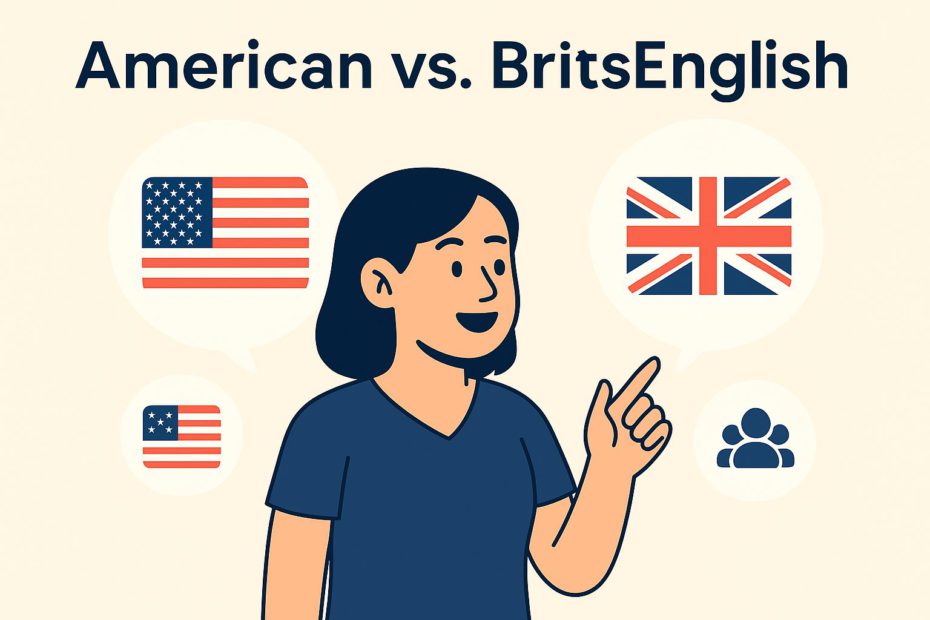English is a global language, spoken in different forms across the world. But did you know that American English and British English—though technically the same language—differ in more ways than just accents? From vocabulary and spelling to grammar and pronunciation, these two major versions of English have evolved with their own distinct identities.
In this article, we’ll explore the key differences between American and British English, so whether you’re writing, speaking, or learning English, you’ll be aware of the variations that matter.
1. Vocabulary: Same Language, Different Words
A key distinction between American and British English lies in the words they use to describe everyday things. Many everyday items and concepts have different names depending on where you are.
Common Examples:
| British English | American English |
|---|---|
| Flat | Apartment |
| Lift | Elevator |
| Lorry | Truck |
| Rubbish | Trash / Garbage |
| Biscuit | Cookie |
| Holiday | Vacation |
| Petrol | Gas / Gasoline |
So, if someone in London asks where the “loo” is, they’re looking for the bathroom!
2. Spelling: Extra U’s and Different Endings
The differences in American and British spellings can be traced back to the 19th century, when American reformer Noah Webster introduced simplified versions of many traditional British spellings.
Key Spelling Differences:
| British English | American English |
|---|---|
| Colour | Color |
| Honour | Honor |
| Organise | Organize |
| Centre | Center |
| Traveller | Traveler |
| Defence | Defense |
Rule of thumb: As a general guideline, British English often preserves spellings influenced by French or Latin, whereas American English typically opts for more streamlined and simplified forms.
3. Pronunciation: Accents and Vowel Sounds
One of the most obvious differences is pronunciation. British English tends to be non-rhotic (the “r” is often not pronounced unless followed by a vowel), while American English is generally rhotic (the “r” is pronounced clearly).
Examples:
- Car
- British: /kɑː/
- American: /kɑr/
- Schedule
- British: /ˈʃedjuːl/
- American: /ˈskedʒuːl/
These variations create regional accents and make English sound quite different depending on where you are.
4. Grammar: Subtle but Important Differences
While grammar rules are largely the same, there are several differences in usage and structure.
Key Differences:
- Present Perfect Tense
- British: I’ve just eaten.
- American: I just ate.
- Collective Nouns
- British: The team are winning.
- American: The team is winning.
- Prepositions
- British: At the weekend
- American: On the weekend
These grammatical quirks can affect writing, especially in formal or academic contexts.
5. Date and Time Format
The way dates are written varies too:
- British English: Day/Month/Year (e.g., 15/06/2025)
- American English: Month/Day/Year (e.g., 06/15/2025)
Time can also be expressed differently:
- British: Half past seven
- American: Seven thirty
6. Punctuation Style
Quotation marks and punctuation placement can also differ:
- British English: Uses single quotes and places punctuation outside the quotes.
- ‘Hello’, he said.
- American English: Uses double quotes and places punctuation inside the quotes.
- “Hello,” he said.
7. Idioms and Expressions
Idioms and everyday expressions can differ dramatically. If you’re unfamiliar with regional phrases, you might misunderstand their meaning.
- British: “I’m feeling peckish.” (I’m a little hungry.)
- American: “I’m starving!” (I’m very hungry.)
Cultural references also influence how phrases are used, especially in informal speech.
Conclusion: Two Varieties, One Language
Despite their differences, American and British English are mutually intelligible. Understanding their variations helps avoid confusion and improves your ability to communicate across borders—whether you’re writing a paper, building an international brand, or just chatting online.
Whether you spell it “realise” or “realize,” what matters most is consistency and clarity in your usage. Choose one variety and stick with it—unless, of course, you’re fluent in both!
Bonus Tip:
If you’re writing for an international audience, American English tends to be more widely recognized online, while British English is preferred in the UK, Australia, and many parts of the Commonwealth.

